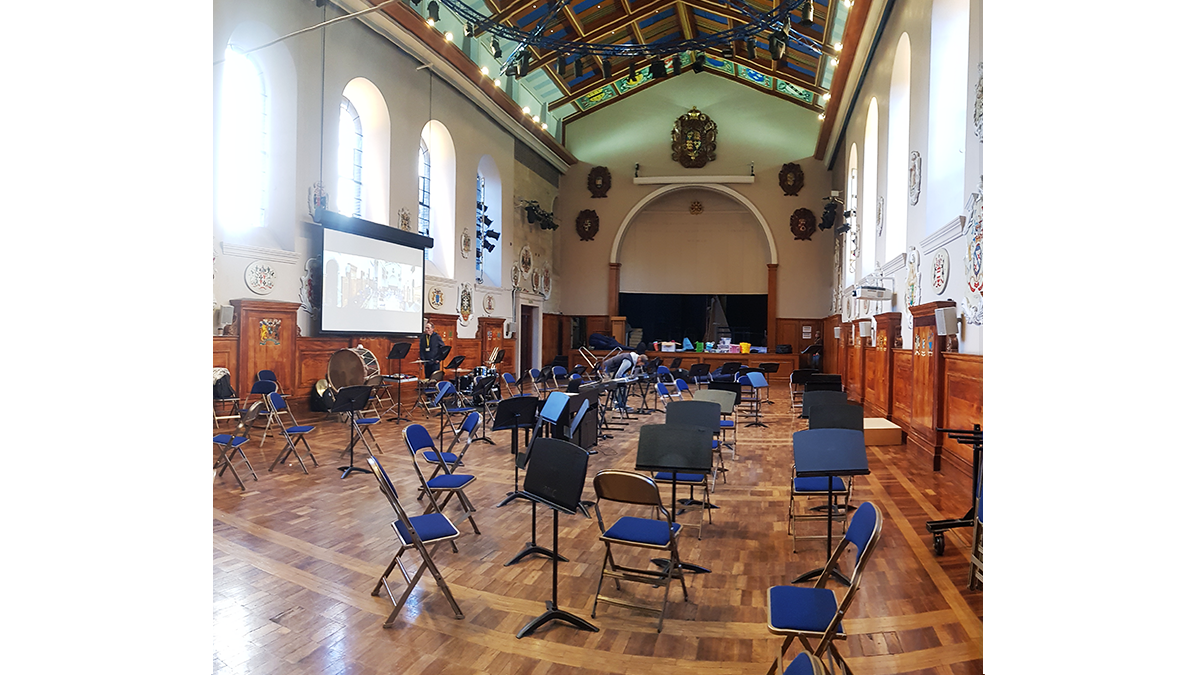From switching up your eating habits and recycling sheet music to challenging fellow musicians, it’s time to go green…
When you’re not busy playing beautiful melodies with your youth orchestra, have you ever wondered what you can do to protect the environment?
Read on as we share 13 of the best ways to become a greener musician…
1. Inspire
Perhaps you’re a composer who also happens to be passionate about making the world a better place? If so, writing or programming pieces that spark conversations can help others understand the impact of our actions in a memorable (and constructive) way.
Music and art are powerful tools for inspiring change , so let’s use them to our advantage!
2. Food and drinks storage
If you’re bringing lunch to a rehearsal, leftovers from the night before can be transported in Tupperware. Cardboard contaminated with food can’t be recycled, so you’ll save a lot of takeaway packaging from going to waste. You’ll also be fighting food waste and saving money at the same time!
Do you own a reusable water bottle? Always keep it in your bag or next to your instrument to help you remember it, then find out what tap water is available at the venue. Recycling plastic bottles is expensive and complicated, so try to invest in an alternative product that will last.
3. Travel
Not only is walking or cycling to rehearsals the greenest way to travel, you’ll reduce your carbon footprint and become healthier at the same time! Make sure you have the right safety gear and find a local cycle training programme if you’re not confident riding on the road.
If you live in a city, familiarise yourself with local bus, train and tram routes. Apps like Citymapper can help you plan with public transport in larger UK cities but if this isn’t available to you, why not carshare with a friend? You’ll use fuel more efficiently and will have someone to chat to after that big concert! Some taxi companies also offer electric cabs for the same price as regular fleets.
4. Rehearsal materials
Looking after your orchestra or choir’s scores (as well as any sheet music of your own) can help them last longer and will reduce the need and cost of buying or printing new versions. If you or your ensemble already has an electronic device to display music, you could also consider making use of this to go green.
Once you’re ready to dispose of sheet music or other unwanted paper and materials, ensure this is recycled.
5. Technology
Did you know that many electronics are made up of rare minerals? This means that their supply chains are often hard to monitor for unethical business practices. When it’s time to update your devices, ensure you purchase good-quality products and with purpose.
Look after them to extend their lifespan and make sure to donate, sell or recycle old items when you no longer need them.
6. Eating habits
It takes a lot of energy to grow out-of-season produce or fly it across the world before it goes off. Avoid eating delicate fruit such as berries in winter and opt for more in-season food, or fruit and vegetables that can be transported by boat over long distances without perishing.
Wherever you can, try to eat less meat and dairy to reduce greenhouse gas emissions. Browse online for new vegetarian or vegan recipes that interest you and incorporate them into your weekly meals. You don’t have to go all the way and completely convert, but even seeing recipes with meat and fish as more of a treat will still make a difference!
7. Musical instruments and accessories
If you own instruments, cases or accessories that you no longer use, think about donating or selling them – this could be to a charity, local shop or even a friend who’s interested in learning.
This will reduce the demand for new items that are often wrapped in excess packaging, while also giving someone the opportunity to pick up a new musical skill at a discount.
8. Stay motivated and informed
Living sustainably can often be challenging and you might find it hard to stay motivated, so why not look for eco-friendly communities where you can share your research and ideas? It’s great to meet like-minded individuals and what’s more, it’ll be much easier to swap recommendations on green podcasts and movies!
Also remember to look out for greenwashing. Not every company means to do it but some give misleading sustainability claims to cover up the true extent of their environmental impact. Use media sources to research their backgrounds and find out how reliable they are: why exactly are they saying what they’re saying? Author John Green’s YouTube video, ‘Navigating digital information’, can help get you started.
9. Rehearsal venues
Have you ever considered how your choice of venue could be impacting the environment? Venues that have efficient waste management and energy systems will have less impact, and close proximity to public transport will make it easier for you or your musicians to access as well as being greener.
If you own a rehearsal space, why not look into ways to improve its environmental rating? If you hire external venues, you might also want to ask what they’re doing to improve their rating.
10. Cleaning
Did you know that 90 per cent of wet wipes used in the UK contain plastic? They are particularly bad for the environment if flushed away in the toilet.
Wherever possible, use reusable cloths as you clean your instruments and workspaces and think about what cleaning products are really necessary.
11. Clothing and concert dress
Do you have an outfit at the back of your wardrobe that you bought for a concert a lifetime ago and never wore again? If so, renting, sharing or buying second hand clothing are greener options if you’re keen to dress up for a performance or after party.
If you do need to buy new clothes, try to find sustainable retailers that show they care about labour and the environmental impact of their supply chains. And rather than disposing of your old orchestra or choir uniform when you leave, you could also donate the clothes to other members. If you run an ensemble, consider a simple dress code that can be made up from your members’ existing wardrobes.
12. Challenge others
Don’t be afraid to remain curious and question any decisions made around you, including at your ensemble’s rehearsals.
Start a conversation with your group leader or peers and ask what areas of sustainability they have considered when running their sessions (if any!). Starting conversations and asking those all-important questions could lead to positive change.
13. Inclusivity
When making changes to your ensemble, the most important thing to remember is to involve as many people from different backgrounds in your decision-making as possible.
Speak to your ensemble members and ensure that you understand what barriers your changes could create. For example, banning the use of plastic straws or cars for driving to rehearsals might pose problems for those with disabilities, while paying more for high-quality materials and expensive venues may not be possible for everyone. Changes made with diversity and inclusion in mind are much more likely to succeed.
“The planet does not need more successful people. The planet desperately needs more peacemakers, healers, restorers, storytellers and lovers of all kinds.”
If you’re experiencing climate anxiety and are in need of some support, Young Minds have shared this valuable resource.

















